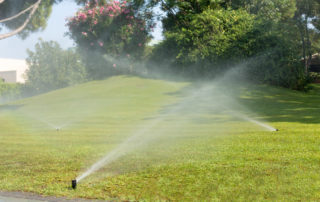Protect Your Irrigation System From Freezing This Winter
With winter just around the corner and temperatures already starting to drop, it's important to consider how this change in the weather can impact your irrigation system. What can easily happen is that your irrigation system freezes. This can cause pipes to burst and create a lot of problems. To prevent this from happening, there are some steps you can take to prepare your irrigation system and commercial landscape for the freezing weather: 1. Insulate The first step is to shut off the water supply to the irrigation system. The main shut-off valve for your irrigation system needs to be protected against freezing by wrapping it in insulation. The best way to insulate this shut-off valve is with foam insulation tape and a plastic bag. If you don't have one of these valves, this is the time to consider having one. Also, insulate any above-ground irrigation pipes you may have has part of your system. You can use self-sticking foam-insulating tape or foam insulating tubes for these above-ground pipes. 2. Go with Manual If you have an automatic irrigation system, this when you need to turn off the timer and handle it manually. Most controllers have what's called a "rain-mode" that shuts off the signals to the valves. Everything else will work. The only change is the valves will not activate. 3. Drain the Pipes The next step is to drain the pipes that are part of the irrigation system. Any water that remains in the pipes during winter can freeze and expand until it breaks the pipes. There are several ways to drain pipes. You can use a manual drain valve, an automatic drain valve, or the compressed air blow-out method. When it comes to draining your pipes, the best option is to turn to a local irrigation specialist due to the risks involved. We do offer sprinkler winterization services during this time of the year. 4. Protect Valves and Backflow Preventers Finally, you will need to return to some insulation work, including insulating the backflow preventers and valves if they are located above ground. Insulation tape also works well for this task. Just be careful to not block the air vents and drain outlets on the backflow preventers. If it all sounds like a lot of work, then consider letting us handle all of this winterization process for you. Contact us now to learn more about all of our winterization services, including snow and ice treatment.


